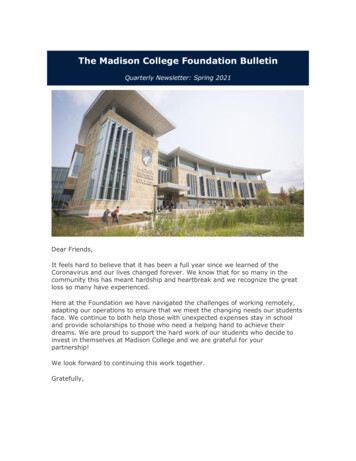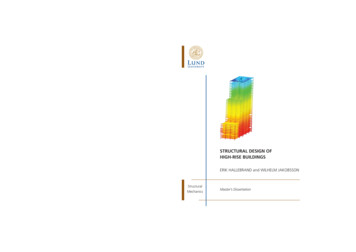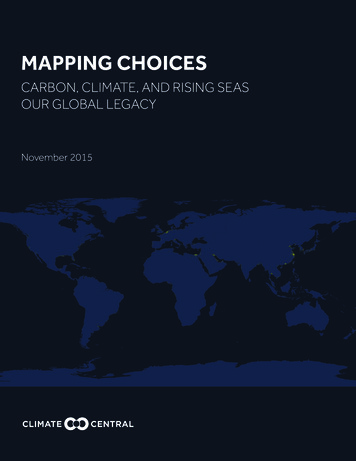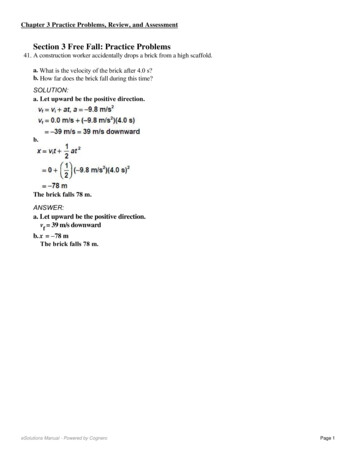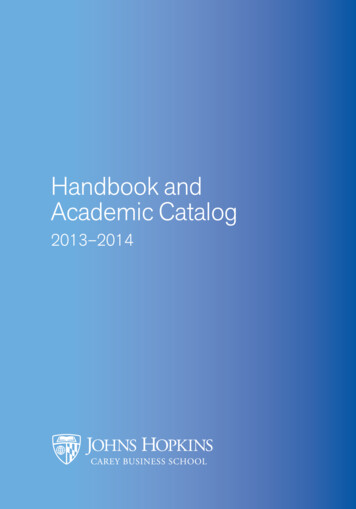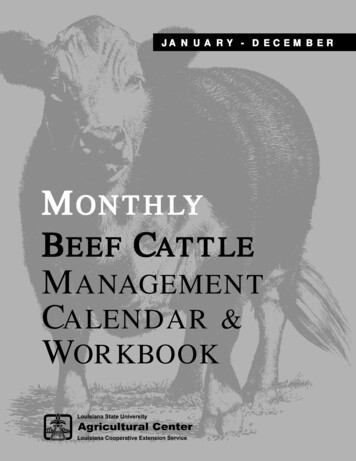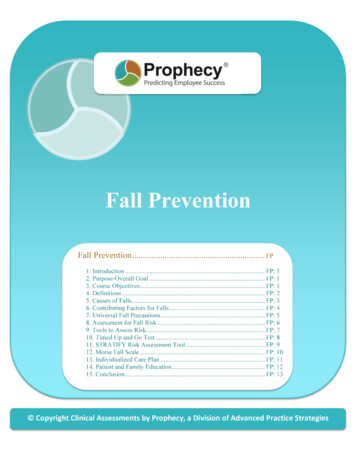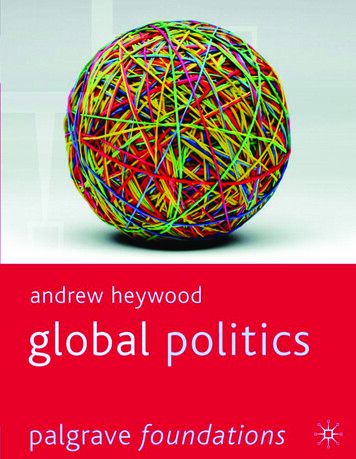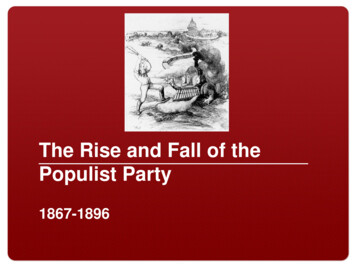
Transcription
The Rise and Fall of thePopulist Party1867-1896
Grange 1867 - Oliver Hudson Kelleyformed farmers group– provide social outlet andeducational forum– Grange 1870’s – Take on Railroads– Farmer Cooperatives Concessions from RR– State Legislation to RegulateRailroads
Farmers’ Problems Crop prices fell Farmers had no cash, wentfurther into debt, and their lendersforeclosed on their mortgages Railroad companies chargedoutrageous prices to ship crops(no regulation!)3
Farmers’ Demands Regulate the railroad companies (Stopthem from charging such high rates) Make cash more available (back the dollarwith silver, not gold, so dollar would beworth less) Constitutional demands: single term forPresident and Vice-President, secret ballot,popular election of Senators To get industrial workers to support them:8-hour workday, restrict immigration4
Monetary System Silver vs. Gold Bimetallism – “Free Silver”– Monetary System based on both gold andsilver, exchanging paper money for either.Silver plentiful. Gold Standard– “Gold Bugs” – Dollar backed solely by Gold Since much more silver, Bimetallismhope cheaper money supply stimulateeconomy5
Different Groups RepresentingFarmers’ Interests 1867: The Patrons of Husbandry (TheGrange) 1880s: Farmers’ Alliance and ColoredFarmers’ National Alliance 1892: Birth of Populist or People’s Party “Movement of the People”6
1892 Presidential Election: Populistcandidate won over a million votes!7
1896 ElectionDemocrats – 1890s Southerners Wealthy farmers Supported low tariffs(wanted othercountries to buy theircrops)Republicans – 1890s Northerners Wealthy businessmen (connected tothe railroad) Southern AfricanAmericans (poorfarmers) Supported high tariffs(didn’t want tocompete with othercountries’ products)8
1896 ElectionPopulists decide to improve theirchances by supporting theDemocratic candidate, WilliamJennings Bryan, who agreed tosupport the silver-backed dollar.9
1896 Presidential Election: Bryan losesbut carries most of the South and West10
Central Historical QuestionWhy did the Populist Party attractmillions of supporters?
American History 11R
How did President Rooseveltchange America?Politically?In Business?Labor?Environmentally?Foreign Affairs?
Progressives in the Executive Office Politically - Change in the Presidency –“Modern Presidency”– Theodore Roosevelt– William Howard Taft– Woodrow Wilson
Theodore Roosevelt Became President upon assassination of McKinley.Youngest president ever, 42 years oldNever expected to be presidentAuthor, Rancher, Environmentalist, NY PoliceCommissioner, Reformer, War Hero, New YorkGovernor, Vice President As president - ends string of weak executives.
New Social Agenda Teddy Roosevelt – Square Deal Programs– Ambitious changes to socialpolicy in U.S. Power of Presidency– “Bully pulpit”– Not since Lincoln Roosevelt loved to lead and tofight those he felt were not actingin America's best interests.
Anthracite Coal Strike Coal Strike - Business vs. Labor again– Coal mine owners refused to deal with union during1902 strike Roosevelt summoned owners & head of mineworkers union to White House Threatened to use army troops - keep mines open Owners and labor backed down Roosevelt credited with ending strike
Elkins Act of 1903 Amendment to Interstate Commerce Act– Illegal for railroad officials to give and shippers toreceive rebates for using particular railroads Railroads had to notify public of ratechanges before they could happen
Northern Securities Co. v. United States(1904) Roosevelt took on J.P. Morgan SC orders breakup of railroad monopoly inPacific Northwest belonging to J.P. Morgan. Roosevelt administration took “trust-busting”action against over forty other American trusts.
Pure Food and Drug Act (1906) Halted sale of contaminated foods and medicines Required truth in labeling Forbade impure foods and required labeling ofingredients of foods and drugs.
Meat Inspection Act of 1906 Dictated strict cleanlinessrequirements for meatpackers andcreated the program of federalmeat inspection
Hepburn Act (1906) Strictly limited the distribution of freerailroad passes - considered form ofbribery. Gave Interstate Commerce Commission(ICC) power to set maximum railroadrates. Strengthened Interstate CommerceCommission
Environmentally Championed Conservation Created National Parks
Foreign Affairs Panama Canal Roosevelt Corollary to Monroe Doctrine Negotiated Peace – Russo-Japanese War– Nobel Peace Prize “Great White Fleet”
Treaty of Portsmouth: 1905Nobel Peace Prize for President Roosevelt
The Great White Fleet: 1907
National Association for theAdvancement of Colored People W.E.B. DuBois (Niagara Movement--1905)urged blacks to assert themselves and agitatefor political and economic rights. Formed NAACP to use legal means to endracial discrimination
American History 11R
What were theaccomplishments ofthe Progressivemovement?
William Howard Taft Elected President 1908. Did not want to be president Continued reformmovement Controversy grows inRepublican Party betweenprogressives andconservatives.
Standard Oil v. United States (1911) During Taft administration, Supreme Courtordered John D. Rockefeller’s Standard OilCompany to be broken up. The Supreme Court’s “rule of reason” wasdeveloped where trusts were not automaticallycondemned. Instead, their actions had to be analyzed to see ifthey were engaged in “unreasonable restraint oftrade.”
Election of 1912 Three way race (Actually four way) Republican Party Splits– Conservatives support William Taft– Progressives support Theodore Roosevelt Democrats support New Jersey GovernorWoodrow Wilson – Reform minded Eugene Debs - Socialist
Progressive “Bull Moose” Party Theodore Rooseveltorganized the NationalProgressive or "BullMoose" Party afterProgressive Republicansleft the Taft-controlledRepublican convention. Party platform includedlong list of Progressivedemands.
1912 Election Results
Wilson AccomplishmentsTariff reform Underwood Tariff (1913) gave first significanttariff reduction since 1860’s as Wilsonpersonally delivered his goals to Congress.Clayton Antitrust Act (1914) Restricted monopolies and set up a FederalTrade Commission to stop unfair practices whichmay arise
Wilson Accomplishments Currency and Banking ReformCreated Federal Reserve System (1913)Took power away from eastern banksand bought stability to industryActed as bankers' banks and prevent"runs" on bank assetsFederal reserve notes issued– a flexible new currency for the bankingsystem – bank to bank transfers
Amendment 16th To establish an income tax or directtax on the population. Passed by Congress in 1909 Ratified by 1913
17th Amendment Senators – selected by state legislators, notby popular vote (more power to politicalbosses and corporations) 1912 – Popular Election of Senatorsapproved by Congress 1913 – Ratified–Made the Direct Election of Senators partof the Constitution
th19Amendment Suffragists - women be given the vote 1920 – Ratified by States Gave women the right to vote 72 years after first organization Seneca Falls Convention in 1848
Weaknesses of Progressive Reform Material progress of Americans weakened zeal ofreformers Myriad of Progressive goals were often confusingand contradictory Opposition to Progressivism apparent asinitiatives failed and courts struck downProgressive legislation Government remained mainly under theinfluence of business and industry Outbreak of World War I dampened enthusiasmof attempts to use governments to create justsocieties on earth
Progressive Accomplishments Trust-busting forced industrialists to noticepublic opinion Legislation gave federal and stategovernments the tools to protectconsumers. Income tax helped build governmentrevenues and redistribute wealth Progressives successfully challengedtraditional institutions and approaches todomestic problems
Teddy Roosevelt - –Square Deal Programs –Ambitious changes to social policy in U.S. Power of Presidency –“Bully pulpit” –Not since Lincoln Roosevelt loved to lead and to fight t


